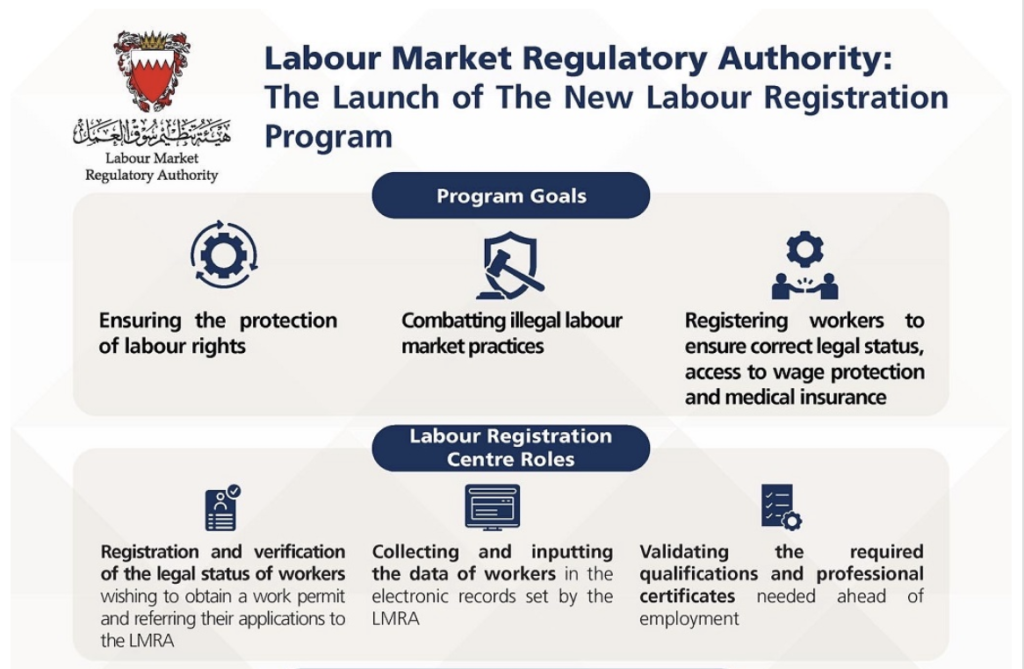Bahrain’s Labor Market Regulatory Authority (LMRA) has officially launched a new “Work Registration Programme” effective December 4, 2022, as part of the country’s recent labour reforms. According to the LMRA, the new initiative will replace the controversial Flexi Permit programme, which was discontinued at the end of October this year.
The LMRA appoints licensed private companies as labor registration centers where migrant workers can apply for “occupational work permits.” The centers must electronically register and regularly update workers’ data, including personal information, bank account details, and authorized occupational activities. The data is then sent to the LMRA for approval.
A more controlled flexi permit?
According to the LMRA, occupational work permit holders will receive a work permit card with a QR code that contains information about the occupation they are permitted to engage in, the permit’s expiry date, health insurance information, and the name of the center that registered the worker.
Only previous flexi-permit holders and “irregular” workers whose permits have expired or been cancelled by their employers are eligible to apply for professional work permits. However, unlike the flexi-permit scheme, which covered all irregular workers, only workers who became irregular before the new permit decision of October 27 are eligible to apply. When the decision came into effect, it was estimated that there were between 90,000 and 110,000 irregular migrants in Bahrain who could theoretically be covered by the scheme.
However, despite the new efforts to regularise the status of illegal immigrants, the Bahraini government last week also stepped up its campaign to arrest and deport illegal immigrants in the country.
Current flexi-permit holders have until February 17, 2023 to convert their flexi-permit to an occupational work permit. According to the LMRA, fees for the remaining flexi-permit period will be credited to workers’ accounts.
Those with criminal records, fugitives, and visit visa holders are not eligible for professional work permits. It is unclear whether domestic workers will be included in the program.
So far, the rules have not clarified whether occupational work permit holders will be subject to the labor law, but the LMRA claims that the new program is aimed at ensuring the protection of workers’ rights.
As with the Flexi-Permit, the cost of the permit is paid in full by the worker. However, the Occupational Work Permit is slightly cheaper than the Flexi-Permit, costing a total of BD527 (USD1,398) for a one-year permit and BD879 (USD2,331) for a two-year permit. The above costs include a monthly fee of BD15 for health and airfare insurance.
Importantly, whereas the LMRA previously offered two types of flexi-permits (a regular flexi-permit that allowed workers to work in any non-professional job, and a flexi-hospitality permit that allowed workers to work in restaurants, salons and hotels), the new occupational work permit will only allow workers to work in a specified occupation without a sponsor.
It is crucial to emphasise that working without a guarantor does not necessarily mean better living or working conditions. As MR has previously reported, flexi permit holders were also vulnerable in other respects compared to regular workers under the kafala law.
Privatization of the Flexi Permit Application Process
Until now, the LMRA was responsible for verifying and processing applications for flexi-permit workers, but the new initiative assigns that task to the private sector. Pursuant to Resolution No. (1) of 2022 on assigning some tasks of the Labor Market Regulator to Labor Registration Centers, private companies can apply to become labor registration centers if they have not previously violated LMRA regulations and can provide a suitable location to receive foreign workers seeking permits to carry out specialized activities.
The Centres, after verifying the availability of the necessary qualifications and professional standards certificates to carry out professional activities, refer the workers’ applications to the LMRA for approval. The Centres are also obliged to notify the LMRA of any violations committed by registered workers and make all data held by the Centres available to LMRA inspectors.
It’s also unclear how private centers will benefit. According to the resolution, the centers may not “deduct any amount or obtain any benefit or advantage from foreign workers for the services provided for in this decision,” and may only charge fees as determined by the LMRA. Furthermore, if a labor registration center goes bankrupt or loses its commercial register for any reason, it must immediately notify the LMRA, and workers registered at that center must register at another center. (For more information on the role of labor registration centers, see here.)
As of December 4, 2022, there are six authorized Labor Registration Centers. There is currently no information on how workers can seek redress in the event of a dispute with a Labor Registration Center.
It remains to be seen how the Occupational Work Permit will work in practice, as few details about the new system have been revealed so far. The LMRA claims that Occupational Work Permit holders cannot obtain commercial registration, which may mean that workers will always be required to work independently for an employer, which was possible under the Flexi Permit. It should be remembered that one of the main reasons the Flexi Permit was revoked was pressure from the Bahrain Chamber of Commerce, which opposed the system due to the expected competition between freelance migrant workers and Bahraini companies. The LMRA has been working closely with the Chamber on the new labour registration programme.
Migrant-Rights.org will update this article as new information becomes available.
(Image provided by the Office of Labor Market Regulation)

